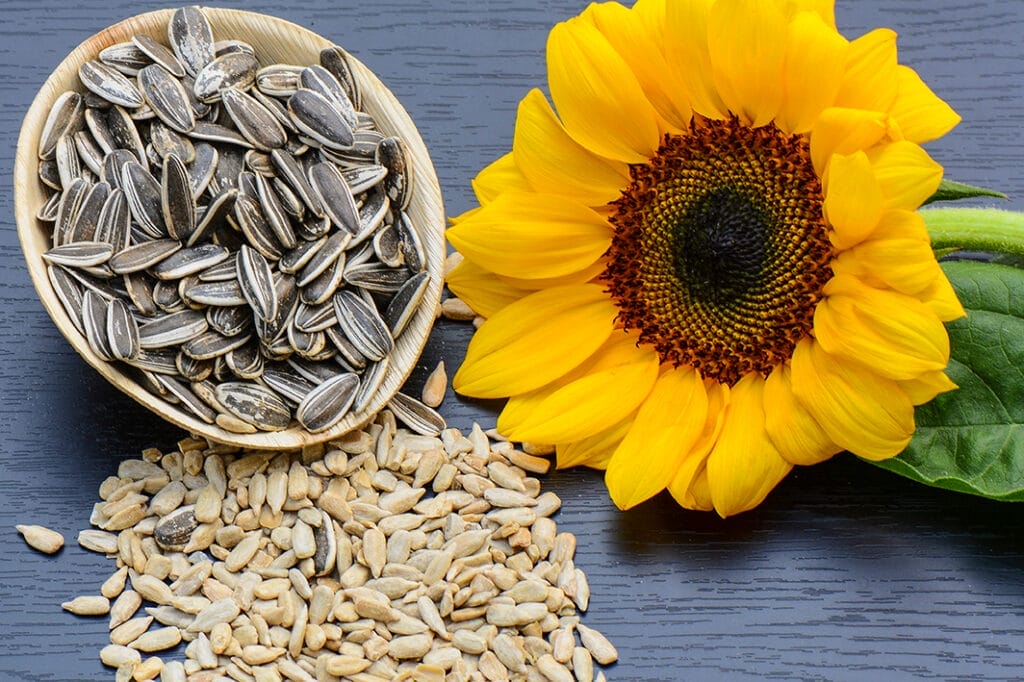Exploring the benefits of sunflower lecithin – harnessing the power of the humble sunflower seed
Lecithin is a substance that often goes unnoticed in everyday consumption however, you have likely encountered lecithin numerous times in your diet without even knowing it. Found naturally in a variety of foods and commonly used as an additive in processed foods such as bread, cakes, biscuits, margarine, salad dressings, chocolate, mayonnaise and more.

What is lecithin?
First isolated from an egg yolk in 1845 lecithin is now a byproduct from the oilseed industry and a common ingredient in manufactured foods, supplements, beauty and skin care products. Lecithin’s amphiphilic nature is key to its versatility and widespread use in various foods and products. Its ability to attract both water and fats/oils allows it to act as an effective emulsifier, facilitating the blending of ingredients that would otherwise not mix such as water and oil.
This natural fatty substance is found in both plants and animals. Eggs are a major source along with soy, krill, fish, roe, and sunflower seeds. Other foods include whole grains, liver, peanuts, cauliflower organic meats and more. In food manufacturing, it is also used as a wetting agent, viscosity reduction and crystallization control. [i]
Lecithin is the name used for a mixture of phospholipids which are fatty substances that have a major role in the health of our cells.

Phospholipids
Phospholipids (fats) are essential components of cell membranes in living organisms, due to their molecules they form lipid bilayers (fatty layers) which are the basic structure of our cell membranes along with specialised proteins. Not only do they have a role in the structure of the cell membrane, but phospholipids also support various functions such as cell signalling, transportation of lipids, cell-to-cell communication, and digestion as well as helping to form the protective barrier where they help to maintain the integrity and fluidity of the cellular membranes.
Phospholipids act like guards around a castle, helping to regulate who and what gets in and out. This selective membrane barrier relies on phospholipids to function, one of the most abundant phospholipids is phosphatidylcholine.
What is phosphatidylcholine?
Phosphatidylcholine (PC) is a specific type of phospholipid that contains choline as one of its components. We can synthesise a small amount in the body, but our main sources are natural foods such as eggs, whole grains fish, organ meats, soybeans, sunflower, broccoli, spinach as well as krill oil.
Sunflower lecithin is a rich source of phosphatidylcholine (PC) which has been researched into its positive effect on brain health and cognitive function. PC is a critical component of the building blocks of the nervous system, including neurotransmitters such as acetylcholine that help to improve memory. It also helps to support energy production, liver health, immune system, digestive health and more.[ii]

Sunflower lecithin
Sunflower lecithin is extracted from the humble sunflower seed, it has very similar functions to the more well-known ‘soy-lecithin’. Lecithin from soybeans has been commonly used in food and supplements over the years however, soybeans have been subjected to genetic modification and therefore many manufacturers prefer the sunflower lecithin which is extracted from the delicate sunflower seeds. Sunflower seeds are not genetically modified and for those with soy allergies and sensitivities, they offer a safer alternative.
Benefits of using sunflower lecithin include:
- Soothes, hydrates and moisturises the skin as well as helping to improve the skin’s barrier function.[iii]
- Helps to lower cholesterol levels and therefore supports cardiovascular health
- Improves digestion as lecithin’s emulsifying properties help to improve healthy mucous levels in our intestines which makes digesting easier whilst helping to protect the delicate mucosal lining
- Aids in the breakdown of fats (emulsifying) making them easier to absorb
- The components of lecithin are naturally found in breast milk and taking in a supplement form has been recommended as a treatment for plugged (blocked) milk ducts which can be very painful and distressing for both mother and baby. Many nursing mothers do not have adequate levels of choline and introducing foods high in choline and supplementing with lecithin has shown to decrease the viscosity of breast milk, easing the flow and the subsequent discomfort.[iv]
When supplementing with sunflower lecithin, look for pure ingredients without any other fillers and additives. Using powdered sunflower lecithin can be easier as it is easily blended into smoothies, foods, or juice. It can also be added to homemade treats such as chocolate or energy bars as well as salad dressings/sauces to give them an added nutritional boost.
From humble snacks and bread toppings, sunflower seeds have evolved into a potent source of phospholipids, further enriching their already impressive array of nutritional benefits.
References
[i] https://www.sciencedirect.com/science/article/abs/pii/B9781630670443500054
[ii] https://www.healthline.com/health/food-nutrition/phosphatidylcholine
[iii] https://www.healthline.com/health/lecithin-benefits#helps-improve-digestion
[iv] https://www.healthline.com/health/parenting/lecithin-breast-feeding#How-Much-Lecithin-Should-I-Take?







